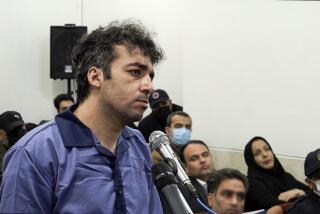Bahrain Sentences 15 Protesters to Prison : Mideast: Emirate hints Iran is funding Shiite activists. But opposition says it seeks democracy.
- Share via
CAIRO — Bahrain, the tiny island nation with a strategic location in the Persian Gulf, has begun handing down prison sentences to the first of dozens of people arrested in six months of anti-government protests by Shiite Muslims that officials have linked to Iran.
Without naming Iran or offering proof, Bahraini officials have suggested the unrest has been orchestrated by a “foreign power.”
But that reference is clear, given contacts between Shiites in Bahrain and Iran. Exiled spokesmen for the protesters deny they are funded or manipulated by Iran and say they are battling to bring democracy to the emirate.
Intermittent demonstrations, rioting, sabotage and arson centered in Shiite suburbs of the capital, Manama, have resulted in at least 14 deaths, both sides say.
The University of Bahrain has been closed for three months, and riot police broke up a demonstration there Sunday.
That same day, local newspapers quoted Majid Jishi, the minister for public works, electricity and water, as saying vandals had caused about $2.3 million in damage to power stations since December.
The state security court sentenced 15 Bahrainis to prison Monday and Tuesday for damaging utility stations, the official Gulf News Agency reported. Ten of those defendants also were convicted of belonging to an illegal organization.
Another defendant received a suspended sentence, and one was acquitted.
Last week, in the first trial to emerge from the unrest, a man was sentenced to 10 years for burning a clubhouse.
Shiite Muslims account for a majority of Bahrain’s 550,000 residents but are disproportionately represented among the poor and unemployed.
The ruling Khalifa family, headed by Sheik Isa ibn Salman al Khalifa, is Sunni Muslim. The emir conducted a short-lived experiment with parliamentary democracy in the mid-1970s but suspended the constitution when the Shiite majority in Parliament became too recalcitrant. He rules today with an advisory council.
The current violence began with the arrest in December of Sheik Ali Salman, a Shiite cleric agitating against the regime. He later was deported and now lives in London. As the unrest continued, the government cracked down harder, arresting dozens of people--some accounts put the total beyond 100--including more Shiite clerics.
A nation of nearly three dozen islands, the largest of which is linked by a causeway to Saudi Arabia, Bahrain is home to a major U.S. Navy base servicing ships that patrol the Persian Gulf.
Bahrain has few oil reserves, and its economy runs on banking and offshore services and on facilities used by larger oil-producing nations of the Gulf. With oil prices flat in recent years, the government has accumulated a series of budget deficits and unemployment has risen.
For many years Iran, which also has a Shiite majority, claimed sovereignty over the islands. Shah Mohammed Reza Pahlavi dropped that claim before he was deposed, and Iran’s post-revolutionary government never has officially revived it.
But history is not lost on Bahrain’s rulers. As the center of Shiite theology, Iran also maintains links with the Shiite clergy in Bahrain.
Sheik Abdul-Hameed Redhi, chairman of the Islamic Front for the Liberation of Bahrain, denied in a telephone interview from London that his group receives financial support from Iran, although it maintains an office in Tehran. He described the group’s goal as democratic reform and not necessarily an Iranian-style Islamic republic.
More to Read
Sign up for Essential California
The most important California stories and recommendations in your inbox every morning.
You may occasionally receive promotional content from the Los Angeles Times.












